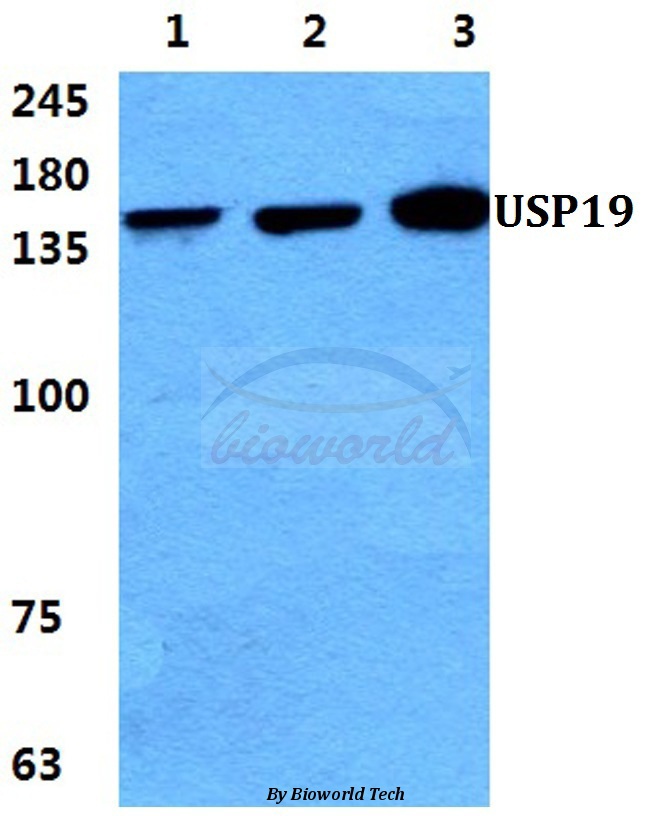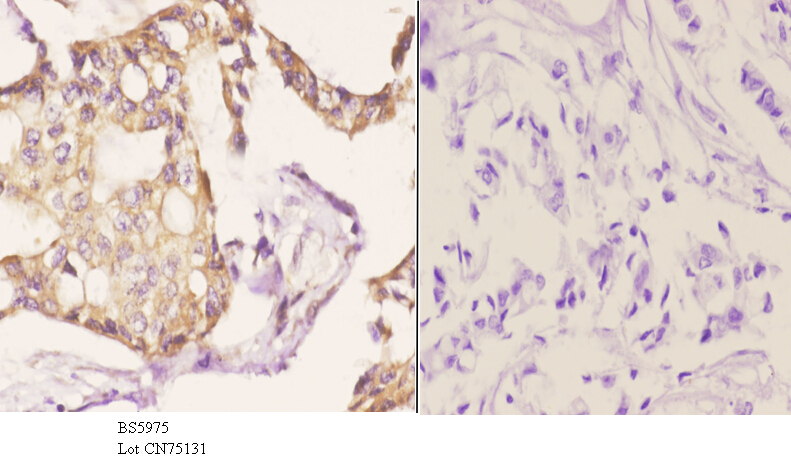Product Name :
USP19 polyclonal antibody Background :
The ubiquitin (Ub) pathway involves three sequential enzymatic steps that facilitate the conjugation of Ub and Ub-like molecules to specific protein substrates. Through the use of a wide range of enzymes that can add or remove ubiquitin, the Ub pathway controls many intracellular processes such as signal transduction, transcriptional activation and cell cycle progression. Ubiquitin-specific-processing protease 19 (USP19), also known as ubiquitin carboxyl-terminal hydrolase 19, ubiquitin thioesterase 19 and deubiquitinating enzyme 19, is a 1318 amino acid member of the peptidase C19 family of proteins. USP19 is thought to be involved in the ubiquitin-dependent proteolytic pathway in conjunction with the 26S proteasome. Four known isoforms of USP19 exist as a result of alternative splicing events. Product :
Rabbit IgG, 1mg/ml in PBS with 0.02% sodium azide, 50% glycerol, pH7.2 Storage&Stability :
Store at 4°C short term. Aliquot and store at -20°C long term. Avoid freeze-thaw cycles. Specificity :
USP19 polyclonal antibody detects endogenous levels of USP19 protein. Immunogen :
Synthetic peptide, corresponding to amino acids 439-484 of Human USP19. Conjugate :
Unconjugated Modification :
Unmodification
USP19 polyclonal antibody Background :
The ubiquitin (Ub) pathway involves three sequential enzymatic steps that facilitate the conjugation of Ub and Ub-like molecules to specific protein substrates. Through the use of a wide range of enzymes that can add or remove ubiquitin, the Ub pathway controls many intracellular processes such as signal transduction, transcriptional activation and cell cycle progression. Ubiquitin-specific-processing protease 19 (USP19), also known as ubiquitin carboxyl-terminal hydrolase 19, ubiquitin thioesterase 19 and deubiquitinating enzyme 19, is a 1318 amino acid member of the peptidase C19 family of proteins. USP19 is thought to be involved in the ubiquitin-dependent proteolytic pathway in conjunction with the 26S proteasome. Four known isoforms of USP19 exist as a result of alternative splicing events. Product :
Rabbit IgG, 1mg/ml in PBS with 0.02% sodium azide, 50% glycerol, pH7.2 Storage&Stability :
Store at 4°C short term. Aliquot and store at -20°C long term. Avoid freeze-thaw cycles. Specificity :
USP19 polyclonal antibody detects endogenous levels of USP19 protein. Immunogen :
Synthetic peptide, corresponding to amino acids 439-484 of Human USP19. Conjugate :
Unconjugated Modification :
Unmodification
-
 Western blot (WB) analysis of USP19 polyclonal antibody at 1:500 dilution Lane1:MCF-7 cell lysate Lane2:HEK293T cell lysate Lane3:H9C2 cell lysate
Western blot (WB) analysis of USP19 polyclonal antibody at 1:500 dilution Lane1:MCF-7 cell lysate Lane2:HEK293T cell lysate Lane3:H9C2 cell lysate -
 Immunohistochemistry (IHC) analyzes of USP19 pAb in paraffin-embedded human breast carcinoma tissue at 1:50.showing endoplasmic reticulum membrane staining. Negative control (the right)Using PBS instead of primary antibody, secondary antibody is Goat Anti-Rabbit IgG-biotin followed by avidin-peroxidase.
Immunohistochemistry (IHC) analyzes of USP19 pAb in paraffin-embedded human breast carcinoma tissue at 1:50.showing endoplasmic reticulum membrane staining. Negative control (the right)Using PBS instead of primary antibody, secondary antibody is Goat Anti-Rabbit IgG-biotin followed by avidin-peroxidase.
Bioworld Biotech only provide peptides for our antibodies and do not provide additional peptide customization services.
Price/Size :
USD 368/1mg/vial
Tips:
For phospho antibody, we provide phospho peptide(0.5mg) and non-phospho peptide(0.5mg).Describe :
Blocking peptides are peptides that bind specifically to the target antibody and block antibody binding. These peptide usually contains the epitope recognized by the antibody. Antibodies bound to the blocking peptide no longer bind to the epitope on the target protein. This mechanism is useful when non-specific binding is an issue, for example, in Western blotting (WB) and Immunohistochemistry (IHC). By comparing the staining from the blocked antibody versus the antibody alone, one can see which staining is specific; Specific binding will be absent from the western blot or IHC performed with the neutralized antibody.Formula:
Synthetic peptide was lyophilized with 100% acetonitrile and is supplied as a powder. Reconstitute with 0.1 ml DI water for a final concentration of 10 mg/ml.The purity is >90%,tested by HPLC and MS.
Storage:
The freeze-dried powder is more stable. For short time at 2-8°C. For long term storage store at -20°C.
Note :
This product is for research use only (RUO only). Not for use in diagnostic or therapeutic procedures.
 USP19 polyclonal antibody
USP19 polyclonal antibody  Datasheet
Datasheet COA
COA MSDS
MSDS SHIP
SHIP